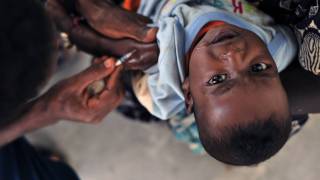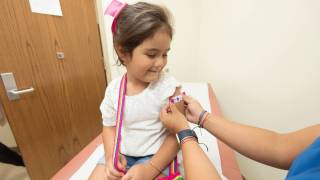Multiple Vaccinations Are Safe For Kids

Infants who receive multiple vaccines are unlikely to be more susceptible to infections not targeted by those vaccines, according to a new study from Kaiser Permanente.
This study reviews the association between multiple vaccines delivered during one session with non-vaccine targeted infections.
The Kaiser study examined the estimated exposure to vaccine antigen through the first 23 months of life in children with non-vaccine targeted infections from ages 24 through 47 months, compared with children without such infections.
These researchers reported the total vaccine antigen exposure was not associated with an increased risk of infections not targeted by vaccines over the next 24 months of life.
Over the last 50 years, there has been a big increase in the number of vaccines given to children. If all these vaccines were given separately, each child would have to receive a large number of injections.
In order to reduce the number of shots a child receives in a doctor’s visit, some vaccines are offered as combination vaccines.
A combination vaccine is two or more different vaccines that have been combined into a single shot.
Combination vaccines have been in use in the United States since the mid-1940s.
Although many studies had examined the safety and efficacy of individual vaccines separately, and in combination with other vaccines, previous studies did not examine the safety of the overall vaccination schedule.
“This new study suggests the theory of overloading an infant's immune system is highly unlikely," said Jason Glanz, Ph.D., lead study author and senior investigator at the Kaiser Permanente Colorado Institute for Health Research.
"We hope this study shines some light on their concerns, helping parents across the nation better understand the safety and benefits of vaccinating on time."
This Institute for Health Research study examined a random sample of 193 children who had been diagnosed with a non-vaccine targeted infection and a control group of 751 children who had not been diagnosed with these infections.
These infections included lower and upper respiratory infections, gastrointestinal infections, and other viral and bacterial infections.
This finding will hopefully provide additional reassurance to parents about the safety of the recommended schedule," said Matthew F. Daley, MD, a study co-author, Kaiser Permanente pediatrician, and researcher at the Institute for Health Research in Colorado.
"Vaccines not only protect children but others in the community who may be more vulnerable to vaccine-preventable diseases," said Dr. Daley.
Immunizations that protect infants and children from vaccine-preventable diseases is one of the greatest achievements of public health, says the Centers for Disease Control and Prevention (CDC).
However, immunization is not without risks.
Vaccines, like any medicine, can have side effects, says the CDC. You are encouraged to report negative side effects of vaccines to the FDA or CDC.
Our Trust Standards: Medical Advisory Committee
- Safety of Multiple Antigen Exposure in the Childhood Immunization Schedule
- Combination vaccines and multiple vaccinations
- Infants who receive multiple vaccinations not at increased risk for infection
- Multiple Vaccines and the Immune System
- Six common misconceptions about immunization
- Immunization Safety Review: Multiple Immunizations and Immune Dysfunction

























